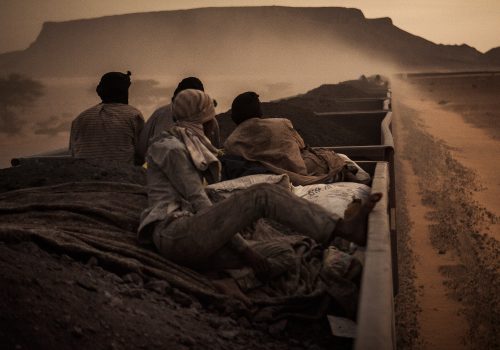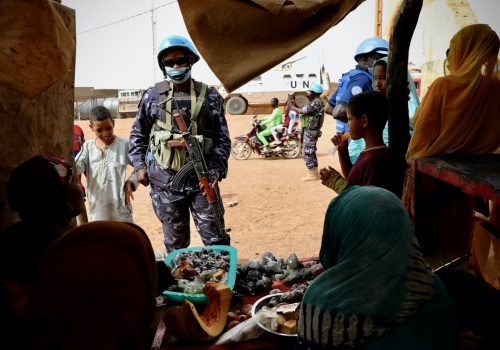Event Recap
At a time when instability and jihadist offensives continue to afflict the Sahel, Niger is a strategic actor in the region. The withdrawal of French and European forces and a renewal of the United Nations Multidimensional Integrated Stabilization Mission in Mali places Niger in a dynamic setting.
The Africa Center spoke with Nigerien President Mohamed Bazoum on the sidelines of the 77th UN General Assembly. The conversation—opened by Atlantic Council President and CEO Fred Kempe, moderated by Africa Center Senior Director Rama Yade, and followed by a panel consisting of Africa Center Senior Fellows Michael Shurkin and Abdoul Salam Bello—touched on topics like education and youth employment, security and Russia, climate, energy, and the upcoming US-Africa Leaders Summit.
In discussing high birth rates among young women in Niger, Bazoum said he wanted to improve education for girls: “The first strategy will be to improve the educational system,” he commented. He further added that, in improving the educational system, the “first thing we have identified is the bad quality of the teachers. We need to rethink our teachers’ training.” Bazoum was hopeful that these steps in adjusting the training of teachers throughout the country will heighten young girls’ access to and quality of education.
Yade further inquired about the issue of youth employment and the solutions for creating jobs in the country. Bazoum prefaced his response, saying that the issue of youth employment is “an extremely complicated problem” and that without stable employment opportunities, “more young people [may] go in the ways of violence.” The conversation highlighted the importance of agriculture as a form of employment for many Nigeriens. As a solution, Bazoum stated that the country would “create agro-industrial ports… that will enable the young people to remain in the country.” He further added that “it is the promotion of agriculture through modernizing it that will help.”
While many international observers continue to monitor the security situation in the Sahel, Shurkin asked Bazoum how Niger is responding to security threats across the border in Mali and what the United States can do to support Niger in these efforts. “You will notice that in three full years, we haven’t been attacked,” stated Bazoum. He highlighted recent developments in the Nigerien armed forces, which increased its capability to defend against national security threats. “We don’t have to do anything on that side of the border [for] the same threats,” he stated. “This is because of the way we decided to position our armed forces.” When asked how the United States can support these efforts, Bazoum noted, “we benefit from great quality training and the equipment that comes with [it].” He emphasized the significant contributions made by the United States in this regard—and highlighted the need for more.
As the war in Ukraine continues to exacerbate challenges on the African continent pertaining to food security, Shurkin asked Bazoum about the degree of Russian influence in Niger. Bazoum stated that he believes the issue of Russian influence is not significant in Niger, saying, “to be honest, I don’t perceive something important to talk about or to denounce.” He continued, saying “we perceive certain activities on social media that apparently come from the actions of the Russian government, but in Niger… this is not a sensitive point.” According to him, Russia does not play a prominent role in Niger.
Following Shurkin’s questions, Salam Bello asked Bazoum questions about the upcoming United Nations Conference of the Parties in Egypt. He stressed that the debate on climate change “isn’t an equal debate,” but rather one whose scales are “not in favor to poor countries” which are the most impacted by the effects of climate change. Furthermore, he discussed the high availability of coal within Niger; however, he argued that certain “strict” measures have been imposed on the country that inhibit its potential to exploit these sources because “there are no more companies that have access to the necessary credits.” Regarding the upcoming conference, Bazoum stated he is “skeptic about the ability to really agree” among countries. His comments pointed to the larger debate about inequities concerning the global climate struggle.
Recent positive developments in Niger in education, security, and employment suggest that the situation in the Sahel may be on an upwards trend. As it stands, the international community must wait and see if other countries are open to following Niger’s example.
Caitlin Mittrick is a young global professional at the Atlantic Council Africa Center and a graduate student at the George Washington University Elliott School of International Affairs.
Original Event
The Atlantic Council is honored to host H.E. Mohamed Bazoum, President of the Republic of Niger, for a broadcasted conversation on the sidelines of the 77th UN General Assembly in New York.
The event is an opportunity to hear the President’s strategic vision to counter security issues in the Sahel and his expectations of the international community in supporting these efforts.
Niger occupies a leading role in a region marked by political instability and jihadist offensives. With the economic consequences of the war in Ukraine, Mali’s withdrawal from the Sahel Alliance, the recent renewal of MINMUSA, and the lifting of sanctions in Mali by ECOWAS, the role of Niger as a strategic actor in the Sahel has increasingly come into focus.
This conversation will touch on topics as wide ranging as: recent developments in Niger’s policies regarding education, youth in the Sahel, security, the environment, energy, Russia, and the US-Africa Leaders Summit.
Speakers
Featuring
Mohamed Bazoum
President
The Republic of Niger
Opening remarks
Frederick Kempe
President and CEO
Atlantic Council
Panelists
Michael Shurkin
Senior Fellow, Africa Center
Atlantic Council
Abdoul Salam Bello
Senior Fellow, Africa Center
Atlantic Council
Moderator
Amb. Rama Yade
Senior Director, Africa Center
Atlantic Council
Recommended content
Hosted by

The Africa Center works to promote dynamic geopolitical partnerships with African states and to redirect US and European policy priorities toward strengthening security and bolstering economic growth and prosperity on the continent.



Follow the conversation on Twitter with @ACAfricaCenter and @AtlanticCouncil using #AfricasTimeHasCome